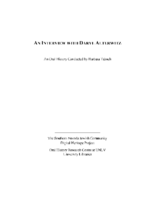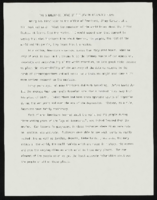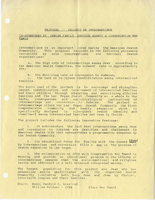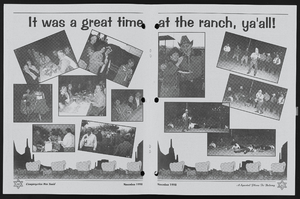Search the Special Collections and Archives Portal
Search Results

Transcript of interview with Daryl Alterwitz by Barbara Tabach, November 8, 2014
Date
Archival Collection
Description
Interview transcript with Daryl Alterwitz by Barbara Tabach on November 8, 2014. In this interview Daryl Alterwitz, son of Deanne and Oscar Alterwitz, recalls moving to Las Vegas from Gary, Indiana, for his parents' pursuits in the furniture business. He speaks about his schooling at Valley High School, his friendship with Robert Engel, and attending University of California Santa Cruz, and taking a leave of absence to travel through Asia. Alterwitz became more involved in Judaism after his bar mitzvah, and has continued his religious affiliation throughout his adult life, and has traveled to Israel twice. He talks about meeting his former wife, his travels through Europe, and coming back to Las Vegas after some time in Reno.
In 1959, Daryl Alterwitz was born in Gary, Indiana, son of Oscar and Deanne Alterwitz. When he was thirteen years old, his family moved to Las Vegas to capitalize on new opportunities in the growing city, and his parents purchased Walker Furniture soon after their arrival. As a high school student, Daryl experienced a powerful trip to Israel, which strengthened his connection to Judaism. After graduation from Valley High School, Daryl attended the University of California - Santa Cruz, and after two years of study, Daryl took time off to travel throughout South Asia, accompanied by close childhood friend Robert Engel. He returned after a year and graduated with an independent major in classical studies. From there, Daryl spent more time in Israel living on a kibbutz. Daryl next went to law school at Santa Clara University, and then supplemented his education with a degree in taxation from New York University School of Law. Between law school and New York, he met his wife, Teri Shoofey; they two had two children, though are now divorced. After New York, he returned to Nevada, first living in Reno. After his father passed away, Daryl moved back to Las Vegas, and took on more responsibility with the family business as well as practicing law. Daryl?s commitment to community service is enduring and visible. He has donated his time and resources to both Jewish organizations, like Jewish Family Services, and non-Jewish groups, like Las Vegas Rescue Mission. He has also served on the boards of the Jewish Federation, Congregation Ner Tamid, and the Anti-Defamation League. Daryl also continues to indulge his passion for international travel, having visited Morocco, Egypt, Turkey, Cambodia, and has even biked from Hungary to Poland.
Text
Jocelyn L. Oats oral history interview
Identifier
Abstract
Oral history interview with Jocelyn L. Oats conducted by Rebecca Snetselaar on April 29, 2016 for the Folklife Program of the Nevada Arts Council and the Oral History Research Center at UNLV Libraries. Oats begins the interview by talking about her childhood and family. She explains what she was allowed to have in terms of media and music, what gospel music means to her, and which members of her family are singers. Oats talks about religion, traditions in church, and what it means to sing in church. Lastly, Oats tells stories of her life and where to find gospel music in Las Vegas, Nevada.
Archival Collection
Loretta Whitney oral history interview
Identifier
Abstract
Oral history interview with Loretta Whitney conducted by Rebecca Snetselaar and Binnie Wilkin on April 15, 2016 for the Folklife Program of the Nevada Arts Council and the Oral History Research Center at UNLV Libraries. Whitney begins talking about her family life, childhood, and family histories. She mentions storytelling in education and what education used to be, and explains why she moved to Las Vegas, Nevada. Whitney begins to speak about religion and the church. She explains her family culture and traditions. Lastly, she defines what loving and caring for others means and how she has evolved personally throughout her life.
Archival Collection

Transcript of interview with Beula Jane Adams by Maureen Beth Conner, May 11, 1977
Date
Archival Collection
Description
Text

"The Stereotypic Image of the Jew in Hollywood Films": manuscript draft by Roosevelt Fitzgerald
Date
Archival Collection
Description
From the Roosevelt Fitzgerald Professional Papers (MS-01082) -- Unpublished manuscripts file.
Text
Maude Woo oral history interviews
Identifier
Abstract
Oral history interviews with Maude Woo conducted by Barbara Tabach on February 11, 2007 and February 25, 2007 for Reflections: the Las Vegas Asian American and Pacific Islander Oral History Project. In these interviews, Woo discusses her early childhood in Korea, taking care of her siblings, and difficult memories of war. Later, she discusses travelling to the United States and having foster parents, and going to college for nursing. She married her first husband and they had two sons, David and John. The family moved to Orange County, California where Maude raised the family and eventually started a private practice. Later, Woo divorced her first husband. She married her current husband, Leland, in 2011. She discusses her family, the importance religion has in her life, and coming to Las Vegas, Nevada to retire. Digital audio and photographs available; digital transcript draft available.
Archival Collection
Bob Fisher oral history interview
Identifier
Abstract
Oral history interview with Robert Fisher conducted by Barbara Tabach on January 08, 2015 for the Southern Nevada Jewish Heritage Project. In this interview, Fisher discusses his childhood in Minnesota, and the large role Judaism played in his upbringing. He speaks at length about his involvement with United Synagogue of Conservative Judaism over the years, including as regional director of the United Synagogue Youth Far West Region, which took him from Minnesota to California. He talks about his time in Los Angeles, California, and later, about his life in Las Vegas, Nevada, including his broadcasting career as well as involvement with Midbar Kodesh Temple.
Archival Collection



